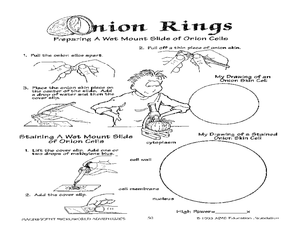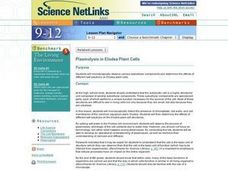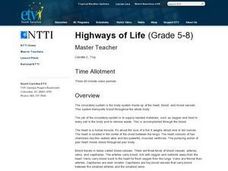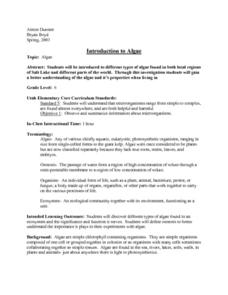Curated OER
WHAT IS A CELL?
Students explore the function and structures of cells, including plant and animal cells. They explore cell parts including cell wall, ribosomes, chromosomes, nucleoid, plasmids, flagella, pilli, and plasma membrane, cel
Curated OER
Plasmolysis in Elodea Plant Cells
Students microscopically observe various subcellular components. They determine the effects of different salt solutions on Elodea plant cells. They detect the presence of chloroplasts, cell walls, and cell membranes of Elodea.
Curated OER
Bread Cells
Fifth graders examine plant and animal cells. In this plant and animal cell lesson, 5th graders define what cells are, label their parts, and describe how plant and animal cells are different. They observe cells at a number of web sites,...
Curated OER
Onion Cells
Students observe the cells of an onion by wet mounting it and viewing it in a microscope. In this hands on lesson students make their own wet mount slide of an onion and are able to identify the cells in it such as, the nucleus,...
Curated OER
Those Cells Look Good Enough to Eat
Students explore the parts of the cell. In this cell lesson, students use foods to create cell models that represent the nucleus, cytoplasm, cell membrane, mitochondria, ribosomes, vacuoles, endoplasmic reticulum, and Golgi bodies...
Curated OER
Parts of a Cell
Students explore the parts of a cell. They identify the structures of plant and animal cells. Students explain the functions of plant and animal cells. They compare and contrast animal cells to plant cells. Students create a model of the...
Curated OER
How Can We Study the Differences in Animal and Plant Cells Using the Compound Microscope?
Young scholars examine their cheek cells with a compound microscope. They identify different parts of the cell. They compare and contrast animal and plant cells with the microscope as well.
Curated OER
The Effects of Osmotic Balance and Imbalance In Living Cells
Learners investigate osmotic balance in living cells. In this osmotic balance lesson plan, students use elodea leaves to study the effects of salt solutions on the cell. They compare the changes in an elodea leaf with salt water on it to...
Curated OER
Plant And Animal Cells
Young scholars identify parts of plant and animal cells and describe the functions of each part. They distinguish between plant and animal cells. After a lecture/demo, students perform experiments which help them construct models of...
Curated OER
Cell Structure and DNA
Sixth graders identify, locate and describe the function of the parts of a cell. In groups, they state the five stages of mitosis and put them in the correct order. They are introduced to the structure of DNA and mRNA and how they...
Curated OER
Plasmolysis in Elodea Plant Cells
Young scholars microscopically observe various subcellular components. They determine the effects of different salt solutions on Elodea plant cells. Students explain the major function of a cell membrane and describe its structure.
Curated OER
Using Microscopes
Students do an experiment using a microscope. In this lesson, about cells, students examine different slides using a microscope. Students look at an onion skin, cheek cells, and potato cells. In each of these, students find cell walls,...
Curated OER
Highways of Life
Young scholars explore the circulatory system. They participate in media activities to explore blood flow and identify the parts of the circulatory sytem. Students create a model of the circulatory system.
Curated OER
Introduction to Algae
Students explore different types of algae found in both local regions of Salt Lake and different parts of the world. They discover different types of algae found in an ecosystem and the significance and function it serves.
Curated OER
Lub Dub
Learners name the vessels and parts of the heart. They trace the path of blood through the heart. Students examine the function of the circulatory system. They recognize the differences between a hear when the body is at rest opposed to...
Curated OER
Plants
Student identify the characteristics of plants. Through hands-on demonstration, they create a model of plant parts. Students differentiate between the major divisions of the plant kingdom with a particular emphasis on the vascular and...
Curated OER
Healthy Heart
Students discover the power of their heart and provide an opportunity to talk about ways to maintain good health. In this early childhood heart lesson, students diagram a human heart, identify exercises that promote a healthy heart, and...
Curated OER
How Does Radon Affect Human Lungs?
Middle schoolers identify the different parts of the respiratory system of the human body. They work together to complete an activity and worksheet about the effects of radon on the lungs. They research lung diseases if time permits.
Curated OER
Plants
Sixth graders examine how plants collect water and breathe. In groups, they participate in a variety of activities in which they discover how plants operate in terrariums. To end the lesson, they discuss why plants are important to the...
Curated OER
Making Paper
Students make paper from recycled paper. The student estimates, counts, and measures he amount of paper consumed in a classroom daily. They discover that if we use too much paper, it fills up landfills. Some activities they are doing...
Curated OER
Discovering Owls
Students are introduced to different types of owls and owl pellets. They list several adaptations that benefit the owls. Students identify the various species of owl that live in Wisconsin. Students discuss owl pellets and identify the...
Curated OER
Applied Science - Science and Math Pre Lab
Students explore human senses. In this applied Science lesson, students utilize their senses to distinguish various objects. Students explain their descriptions.





















